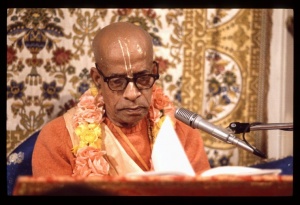SB 7.9.2

A.C. Bhaktivedanta Swami Prabhupada
TEXT 2
- sākṣāt śrīḥ preṣitā devair
- dṛṣṭvā taṁ mahad adbhutam
- adṛṣṭāśruta-pūrvatvāt
- sā nopeyāya śaṅkitā
SYNONYMS
sākṣāt — directly; śrīḥ — the goddess of fortune; preṣitā — being requested to go forward before the Lord; devaiḥ — by all the demigods (headed by Lord Brahmā and Lord Śiva); dṛṣṭvā — after seeing; tam — Him (Lord Nṛsiṁhadeva); mahat — very big; adbhutam — wonderful; adṛṣṭa — never seen; aśruta — never heard of; pūrvatvāt — due to being previously; sā — the goddess of fortune, Lakṣmī; na — not; upeyāya — went before the Lord; śaṅkitā — being very much afraid.
TRANSLATION
The goddess of fortune, Lakṣmījī, was requested to go before the Lord by all the demigods present, who because of fear could not do so. But even she had never seen such a wonderful and extraordinary form of the Lord, and thus she could not approach Him.
PURPORT
The Lord has unlimited forms and bodily features (advaitam acyutam anādim ananta-rūpam (BS 5.33)). These are all situated in Vaikuṇṭha, yet Lakṣmīdevī, the goddess of fortune, being inspired by līlā-śakti, could not appreciate this unprecedented form of the Lord. In this regard, Śrīla Madhvācārya recites the following verses from the Brahmāṇḍa Purāṇa:
- adṛṣṭāśruta-pūrvatvād
- anyaiḥ sādhāraṇair janaiḥ
- nṛsiṁhaṁ śaṅkiteva śrīr
- loka-mohāyano yayau
- prahrāde caiva vātsalya-
- darśanāya harer api
- jñātvā manas tathā brahmā
- prahrādaṁ preṣayat tadā
- ekatraikasya vātsalyaṁ
- viśeṣād darśayed dhariḥ
- avarasyāpi mohāya
- krameṇaivāpi vatsalaḥ
In other words, for the common men the form of the Lord as Nṛsiṁhadeva is certainly unseen and wonderful, but for a devotee like Prahlāda Mahārāja such a fearsome form of the Lord is not at all extraordinary. By the grace of the Lord, a devotee can very easily understand how the Lord can appear in any form He likes. Therefore the devotee is never afraid of such a form. Because of special favor bestowed upon Prahlāda Mahārāja, he remained silent and unafraid, even though all the demigods, including even Lakṣmīdevī, were afraid of Lord Nṛsiṁhadeva. Nārāyaṇa-parāḥ sarve na kutaścana bibhyati (SB 6.17.28). Not only is a pure devotee of Nārāyaṇa like Prahlāda Mahārāja unafraid of any dangerous condition of material life, but also if the Lord appears to mitigate the fear of a devotee, the devotee maintains his status of fearlessness in all circumstances.